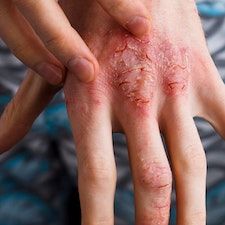Article
Study Suggests Healthcare Workers Developed Hand Eczema During COVID-19 Pandemic
Author(s):
A recent study examined the increased rates of eczema on the hands of health workers more during the COVID-19 outbreak.

Rates of hand eczema among healthcare workers rose during the recent COVID-19 pandemic, according to recent findings.
Due to the significantly increased attention to hand hygiene especially by healthcare workers during the pandemic, the study’s investigators sought to examine the effects of some of these hygiene products on hand eczema rates.
The study was led by Monika Sroczyńska from the Military Medical Academy Memorial Teaching Hospital of the Medical University of Lodz in Poland.
“The purpose of the study was to examine the prevalence of hand eczema as a consequence of more intensive hand hygiene among healthcare workers during COVID-19 pandemic,” Sroczyńska and colleagues wrote.
Background and Findings
The research team developed their research by conducting searches through such databases as PubMed and Google Scholar. They explored the databases for data using several keywords, including the following:
- hand eczema
- hand dermatitis
- SARS-CoV-2
- atopic dermatitis
- COVID-19
The results of the study indicated that these workers had indeed developed hand eczema at higher rates during the COVID-19 pandemic.
The investigators noted that risk for hand eczema was higher due to several factors: common use of alcohol-based hand sanitizers, glove use, hand hygiene product use, prior history of atopic dermatitis, and being of the female sex.
“Findings demonstrated positive correlation between hand eczema prevalence among healthcare professionals and COVID-19 pandemic,” they summarized.
The research team added its conclusion that excessive hand hygiene led to the breakdown of the hand’s natural skin barrier function, which then resulted in hand eczema.
They also cited that using preventative skincare products may help to reduce risk of hand eczema. Some commonly-used products for eczema prevention may include moisturizing creams, although the investigators do not cite specifics of which interventions work best.
“Hand washing and the use of disinfectants disrupt the natural skin barrier function, leading to allergic and irritating hand eczema,” they concluded. “In order to continue practicing hand hygiene during the continuing pandemic, proper prevention strategies and education should be implemented.”
The study, “Hand eczema prevalence among healthcare workers during COVID-19 pandemic – a systematic review,” was published online in the Journal of Education, Health and Sport.





